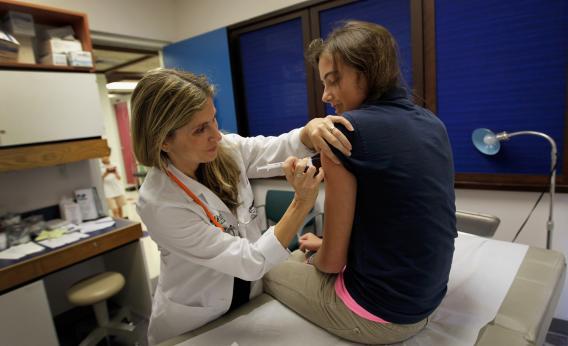A new study has found that inoculating 11-year-old girls against cancer-causing strains of HPV does not inspire them to rip off the nurse’s band-aid and run off to have sex with boys. These findings seem almost too obvious to report, except for the fact that since the HPV vaccine was FDA-approved in 2006, conservatives have been airing concerns that protecting girls from sexually transmitted diseases would constitute a “license for sex,” send “a message essentially encouraging promiscuity,” and encourage pre-teens to “treat sex more loosely.”
Not true: The study, published this month in Pediatrics, found that American girls who receive the CDC-recommended HPV vaccination at age 11 and 12 aren’t any more likely to turn up pregnant, STD-infected, or on birth control pills three years later. Now that we’ve established that, let’s address the underlying fears behind the absurd claim. Only the most conservative voices will say out loud that preventative sexual healthcare will turn our pre-teen girls “loose,” but the skepticism of the HPV vaccine is not just a fringe view. Though the CDC recommends vaccinating girls before they hit their teen years, only about a third of American teenage girls have received the full three-shot program. Financial and logistical barriers play a part, but some of the resistance stems from the idea that the HPV vaccine is a moral issue, and the government should stay out of it.
New evidence that HPV vaccine doesn’t encourage sexual activity is unlikely to change that view. I suspect that the real fear is not that the vaccine might cause girls to have sex. It’s that it will definitely require parents to talk about sex.
Today’s teenagers are less sexually active than previous generations: In 1995, 39 percent of 15 to 17-year-old girls had had sex; by 2010, that number had dropped to 27 percent. (These studies measured rates of vaginal intercourse—they don’t address oral sex). But the discourse around youth sexuality is not necessarily improving. And the longer young people wait to have sex, the more parents believe they can wait to discuss it with them. One 2010 study found that the parents of pre-teens “believed it is important to talk to their children about sex and believed that doing so can be effective, but many had not done so.” When handed a questionnaire about how they handle the birds and the bees talk, parents reported significant barriers to discussing sex with their kids, including “feeling uncomfortable,” “thinking that someone else could do it better,” and “thinking that it might encourage their children to have sex.” When the parents were brought into focus groups to tease out these issues, though, they rarely raised the justification that it would inspire their kids to have sex. Sounds like an excuse to me.
Just as the HPV vaccine is most effective before girls become sexually active, talking to kids about sex before they’re having it is smart preventative care. And while discussing the vaccine with daughters and sons (the CDC also now recommends the vaccine for boys) might seem awkward, it’s an easy in for starting a conversation. There is even some evidence that the HPV vaccination can help educate kids about sexual health more broadly: The Pediatrics study reports that girls who were vaccinated were more likely to use condoms when they did start having sex, indicating “a greater understanding of reproductive health and prevention.” The HPV vaccine does “send a message” to young girls. That’s a good thing.
